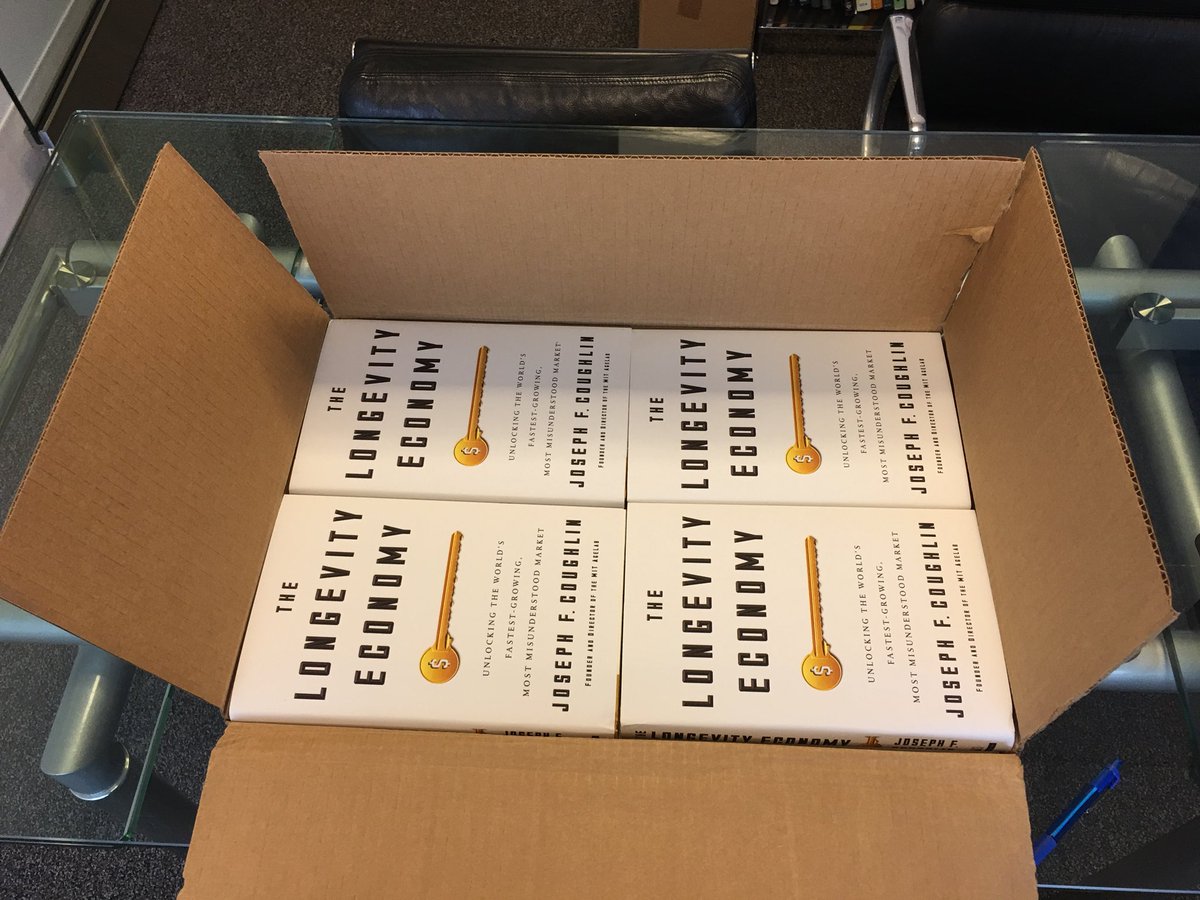 "Old age (as a concept) is made up. Most of it was invented by human beings for short-term, human purposes over the past century and a half. Today, we’re stuck with a notion of oldness that is so utterly at odds with reality that it has become dangerous. It constrains what we can do as we age, which is deeply troubling, considering that the future of our older world will naturally hinge on the actions of the older people in it."
"Old age (as a concept) is made up. Most of it was invented by human beings for short-term, human purposes over the past century and a half. Today, we’re stuck with a notion of oldness that is so utterly at odds with reality that it has become dangerous. It constrains what we can do as we age, which is deeply troubling, considering that the future of our older world will naturally hinge on the actions of the older people in it."
– Dr. Joseph Coughlin
I met Joe Coughlin in 2006. We were presenting at a private conference for a pharma outfit, still wet behind our hairy ears.
I had attended and/or spoke at various marketing and boomer conferences - and thought I’d heard it all. But Joe’s presentation was like no other. We chatted on and off through the day and shared a cab to the airport.
Since then, Dr. Coughlin and MIT AgeLab have become potent forces researching, investigating, educating, and promoting all things elder.
 The focus of AgeLab has evolved. In the beginning it was gizmos, mostly. Now it encompasses just about every facet of age-related life:
The focus of AgeLab has evolved. In the beginning it was gizmos, mostly. Now it encompasses just about every facet of age-related life:
AgeLab Research Themes & Projects
Dr. Coughlin’s new book is likewise like no other.
The Longevity Economy
 … Coughlin provides deep insight into a population for whom the defiance of expectations is the new normal, and who are building a striking, unheralded vision of longer life that very few in business see coming. His focus on women -- who are leading the charge away from traditional ideas of retirement toward tomorrow's narrative -- is especially illuminating …
… Coughlin provides deep insight into a population for whom the defiance of expectations is the new normal, and who are building a striking, unheralded vision of longer life that very few in business see coming. His focus on women -- who are leading the charge away from traditional ideas of retirement toward tomorrow's narrative -- is especially illuminating …
Google The Longevity Economy and/or Joseph Coughlin for press and reviews, along with videos of his appearances over the last decade.
My take:
Dr. Coughlin covers a handful of subjects I’ve written and talked about for years: advertising/marketing and the horrors of not understanding this demographic, the importance of entrepreneurs, the power of women as decision-makers, etc.
What I love about the book: Joe’s fascination with history. No matter what the subject, he delves into all the antecedents.
My presentations usually include a history of advertising. I talk about diversity and creativity through the years. So, I’m a sucker for history.
For me, the paragraph summing up the book is on (appropriately enough) page sixty-five:

A few selections from my book and blog:
Advertising to Baby Boomers, ©2005,2007
 … I'm fifty-four, and (according to the advertising and marketing industry) I haven't brushed my teeth, bought laundry soap, purchased a shirt, or taken a shower in almost twenty years. And as far as big ticket items - well, those rabbit ears work just fine on my 13-inch black & white T.V. They just need a nudge and a jiggle every now and then, that's all. And if a new needle is needed for my phonograph, I just get in my '73 Pinto and head over to the Goodwill and, when no one's looking, twist one off of a dusty old turntable and put it in my pocket ...
… I'm fifty-four, and (according to the advertising and marketing industry) I haven't brushed my teeth, bought laundry soap, purchased a shirt, or taken a shower in almost twenty years. And as far as big ticket items - well, those rabbit ears work just fine on my 13-inch black & white T.V. They just need a nudge and a jiggle every now and then, that's all. And if a new needle is needed for my phonograph, I just get in my '73 Pinto and head over to the Goodwill and, when no one's looking, twist one off of a dusty old turntable and put it in my pocket ...
09 April 2009
Why couldn’t it have been…?
 … I guess what upsets me about this campaign is not the campaign itself. I like it. I see people around my age – they’re entertaining, loose, funny. I’m wondering what the payoff will be. What a letdown.
… I guess what upsets me about this campaign is not the campaign itself. I like it. I see people around my age – they’re entertaining, loose, funny. I’m wondering what the payoff will be. What a letdown.
Why couldn’t it have been a car? Laundry soap? A computer? A razor? Anything but some age-related malady …
 16 September 2009
16 September 2009
Boomer Backlash II
… If every time someone over fifty sees a commercial targeting them and it’s always for an age-related product or service, pretty soon their eyes will glaze over, they’ll get itchy and grumpy.
The Real Issue: Marketing and advertising folks grasping the fact that Boomers will be buying billions (trillions?) of dollars worth of non-age related products for the next twenty-odd years. If you target this group for toothpaste, computers, clothes, food, nail polish, sporting equipment, toenail clippers - anything at all (almost), and you do it with respect and finesse, they will appreciate and consider your product.
I’ve been scribbling and bellowing about advertising and baby boomers since 2003. After the first few years it dawned on me that I was part of a bigger picture. Admitted blustery profundity: We’re changing society and the effects will be felt for generations. Millennials will be old someday and they’ll be old longer than we’ll be old. We’re paving the way.
There are lots of folks who’ve educated us and continue to educate us. Names off the top of my head: Robert N. Butler, David Wolfe, Ken Dychtwald, John Migliaccio, Kurt Medina, Matt Thornhill, Brent Green, Marti Barletta, Mary Furlong, Myrna Blyth, Carol Orsborn, Rick Moody, Mark Miller, Paul Kleyman, Scott Rains, Kevin Lavery, Dick Stroud, Reg Starkey, Laurie Orlov, Richard Adler, Todd Harff, Bill Thomas, Louis Tenenbaum, Arjan in’t Veld, Martijn de Haas, David Cravit, Moses Znaimer, Maxime de Jenlis, Florian Kohlbacher, Christopher Simpson, Gail Sheehy, Marc Middleton, Ronni Bennett, Jim Gilmartin, Gill Walker, Dave McCaughan, Kim Walker, Tony Mariani, Barry Robertson, Frédéric Serriere, Bob Hoffman, have I left any out? No doubt.
 Joe Coughlin is the Point Man/Person at the moment. Read the book.
Joe Coughlin is the Point Man/Person at the moment. Read the book.
Posts about MIT AgeLab and Joseph Coughlin:
22 April 2008
Bookmarked Brains: MIT AgeLab
19 May 2009
Fast Company Names Joseph Coughlin to Top 100 List
12 April 2010
Designing for Older Consumers
04 August 2010
Universal Design As A Beginning, Not An End
 Just for fun
Just for fun:
 The Dotty Thing
The Dotty Thing
by Chuck Nyren
On the way to the store to do Thanksgiving dinner shopping. She’s thumbing through the newspaper inserts and reviewing her list …
It’s always a treat to get up, make some coffee, open the newspaper (pixels or pulp) and read nothing new.
 Black Ops Advertising by Mara Einstein
Black Ops Advertising by Mara EinsteinNothing I can think of is as lively and chipper as television in its final throes.
Along with Google Glasses, you'll also be wearing Google Nose and Google Mouth.

 A second favorite excuse of agencies is: "Baby Boomers don't change brands" (p. 52, italics in original). Nyren dismantles this excuse nicely with examples of brand switching, and he further acknowledges that in cases where loyalty to a brand does exist, marketers who do not target Boomers give them no reason to change.
A second favorite excuse of agencies is: "Baby Boomers don't change brands" (p. 52, italics in original). Nyren dismantles this excuse nicely with examples of brand switching, and he further acknowledges that in cases where loyalty to a brand does exist, marketers who do not target Boomers give them no reason to change.

 The focus of AgeLab has evolved. In the beginning it was gizmos, mostly. Now it encompasses just about every facet of age-related life:
The focus of AgeLab has evolved. In the beginning it was gizmos, mostly. Now it encompasses just about every facet of age-related life: … Coughlin provides deep insight into a population for whom the defiance of expectations is the new normal, and who are building a striking, unheralded vision of longer life that very few in business see coming. His focus on women -- who are leading the charge away from traditional ideas of retirement toward tomorrow's narrative -- is especially illuminating …
… Coughlin provides deep insight into a population for whom the defiance of expectations is the new normal, and who are building a striking, unheralded vision of longer life that very few in business see coming. His focus on women -- who are leading the charge away from traditional ideas of retirement toward tomorrow's narrative -- is especially illuminating …

 … I guess what upsets me about this campaign is not the campaign itself. I like it. I see people around my age – they’re entertaining, loose, funny. I’m wondering what the payoff will be. What a letdown.
… I guess what upsets me about this campaign is not the campaign itself. I like it. I see people around my age – they’re entertaining, loose, funny. I’m wondering what the payoff will be. What a letdown. 
 Joe Coughlin is the Point Man/Person at the moment.
Joe Coughlin is the Point Man/Person at the moment.  The Dotty Thing
The Dotty Thing The famed Soothsayer and advertising gadfly has been startling the world for nigh on a decade with his mundane prognostications. Over the last eleven months, he’s been featured in nearly every other post.
The famed Soothsayer and advertising gadfly has been startling the world for nigh on a decade with his mundane prognostications. Over the last eleven months, he’s been featured in nearly every other post.
 … The more people use smartphones, the less they’ll tolerate silly graphical doodads mucking up their small screens ... Advertising on smartphones will be considered an annoyance, invasive, and rather dinky …
… The more people use smartphones, the less they’ll tolerate silly graphical doodads mucking up their small screens ... Advertising on smartphones will be considered an annoyance, invasive, and rather dinky … 04 November 2013
04 November 2013 22 September 2015
22 September 2015 There are more. But NostraChuckus’
There are more. But NostraChuckus’  01 May 2017
01 May 2017




 03 October 2016
03 October 2016



 Some are all over Skype, video and music uploading and downloading, research, education, travel planning, shopping—while eschewing blogging, communities, and web page design. Or it’s the other way around. Or variations thereof. When it comes to new technology, most Baby Boomers learn only about what interests them, what they believe will be useful. They don’t feel the need to know everything there is to know about technology, computers, and the web.”
Some are all over Skype, video and music uploading and downloading, research, education, travel planning, shopping—while eschewing blogging, communities, and web page design. Or it’s the other way around. Or variations thereof. When it comes to new technology, most Baby Boomers learn only about what interests them, what they believe will be useful. They don’t feel the need to know everything there is to know about technology, computers, and the web.” …. An odd mix of technology service providers, health tech vendors (multiple categories), and startups …
…. An odd mix of technology service providers, health tech vendors (multiple categories), and startups …
 Harry (Rick) Moody, former Vice President and Director of Academic Affairs for AARP, tackles disillusionment in an engrossing piece for The American Society on Aging.
Harry (Rick) Moody, former Vice President and Director of Academic Affairs for AARP, tackles disillusionment in an engrossing piece for The American Society on Aging. 
 Over the past two decades, Joseph F. Coughlin has been busting myths about aging with groundbreaking multidisciplinary research into what older people actually want—not what conventional wisdom suggests they need. In The Longevity Economy, Dr. Coughlin provides the framing and insight business leaders need to serve the growing older market…
Over the past two decades, Joseph F. Coughlin has been busting myths about aging with groundbreaking multidisciplinary research into what older people actually want—not what conventional wisdom suggests they need. In The Longevity Economy, Dr. Coughlin provides the framing and insight business leaders need to serve the growing older market…





 COSTUME 1: SUPERHERO
COSTUME 1: SUPERHERO

